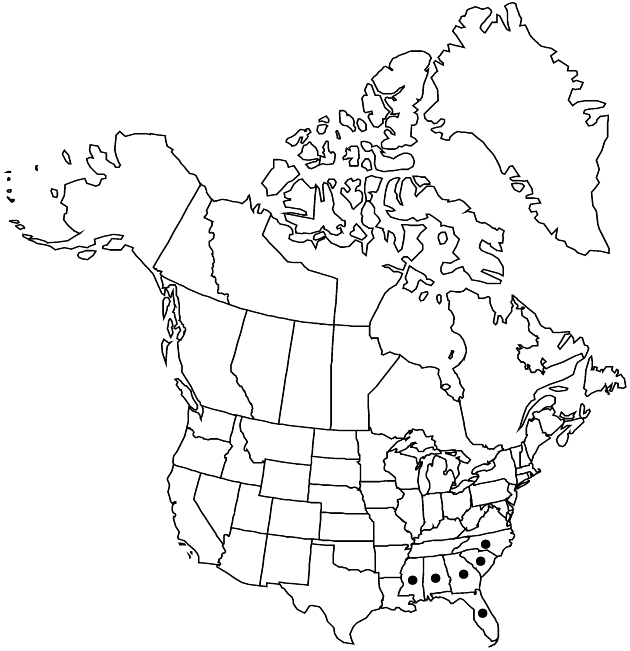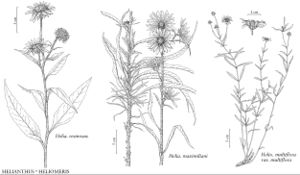Difference between revisions of "Helianthus resinosus"
Fl. S.E. U.S., 1269, 1340. 1903.
FNA>Volume Importer |
FNA>Volume Importer |
||
| Line 24: | Line 24: | ||
|elevation=0–900+ m | |elevation=0–900+ m | ||
|distribution=Ala.;Fla.;Ga.;Miss.;N.C.;S.C. | |distribution=Ala.;Fla.;Ga.;Miss.;N.C.;S.C. | ||
| − | |discussion=<p>Consistent with its epithet, Helianthus resinosus has abundant subsessile glandular hairs (“resin dots”) on its leaves, phyllaries, paleae, and ray laminae. It intergrades and has been reported to hybridize with H. tuberosus. It is cultivated and usually sold under the long-misapplied name H. tomentosus Michaux.</p> | + | |discussion=<p>Consistent with its epithet, <i>Helianthus resinosus</i> has abundant subsessile glandular hairs (“resin dots”) on its leaves, phyllaries, paleae, and ray laminae. It intergrades and has been reported to hybridize with <i>H. tuberosus</i>. It is cultivated and usually sold under the long-misapplied name H. tomentosus Michaux.</p> |
|tables= | |tables= | ||
|references= | |references= | ||
| Line 48: | Line 48: | ||
|publication year=1903 | |publication year=1903 | ||
|special status= | |special status= | ||
| − | |source xml=https://jpend@bitbucket.org/aafc-mbb/fna-data-curation.git/src/ | + | |source xml=https://jpend@bitbucket.org/aafc-mbb/fna-data-curation.git/src/8f726806613d60c220dc4493de13607dd3150896/coarse_grained_fna_xml/V19-20-21/V21_390.xml |
|tribe=Asteraceae tribe Heliantheae | |tribe=Asteraceae tribe Heliantheae | ||
|subtribe=Asteraceae (tribe Heliantheae) subtribe Helianthinae | |subtribe=Asteraceae (tribe Heliantheae) subtribe Helianthinae | ||
Revision as of 15:34, 18 September 2019
Perennials, 100–300 cm (rhizomatous). Stems (often reddish or purplish) erect, hirsute or villous. Leaves mostly cauline; mostly alternate; petioles 0.5–2 cm (broadly winged); blades lanceolate to ovate, 6.5–20 × 3.2–9 cm, bases gradually narrowed (onto petioles), margins entire or serrate, abaxial faces hirsute to tomentose, gland-dotted. Heads 1–5. Peduncles 1–3 cm. Involucres hemispheric, 15–27 mm diam. Phyllaries 20–30 (squarrose to reflexed, at least tips), lanceolate, 10–21 × 3–5 mm (notably surpassing discs), apices acute to attenuate, abaxial faces hispid to villous, densely gland-dotted (at least toward apices). Paleae 9–11 mm, 3-toothed (gland-dotted). Ray florets 10–20; laminae (often light yellow) 18–30 mm. Disc florets 90+; corollas 8–8.5 mm, lobes yellow; anthers dark, appendages dark. Cypselae 5–7 mm, glabrate; pappi of 2 aristate scales 2.4–2.6 mm. 2n = 102.
Phenology: Flowering late summer–fall.
Habitat: Roadsides, open areas
Elevation: 0–900+ m
Distribution

Ala., Fla., Ga., Miss., N.C., S.C.
Discussion
Consistent with its epithet, Helianthus resinosus has abundant subsessile glandular hairs (“resin dots”) on its leaves, phyllaries, paleae, and ray laminae. It intergrades and has been reported to hybridize with H. tuberosus. It is cultivated and usually sold under the long-misapplied name H. tomentosus Michaux.
Selected References
None.
